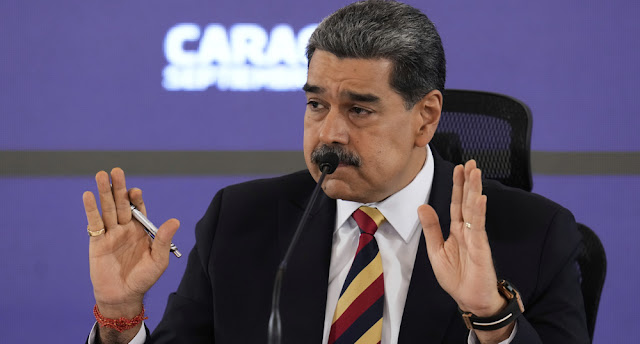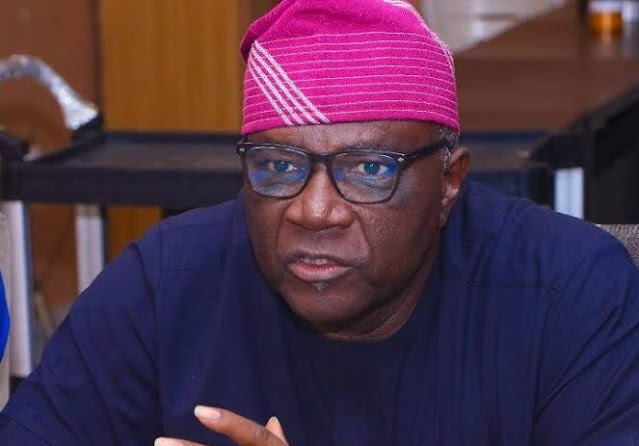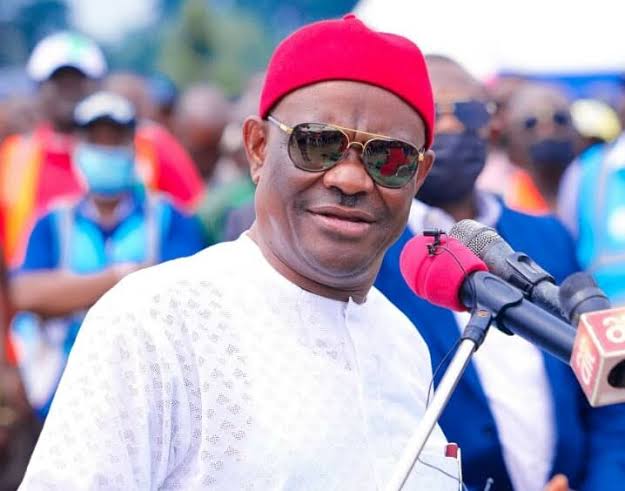Venezuela’s President Nicolas Maduro speaks during a press conference in Caracas, Venezuela, September 1, 2025. (Photo by AP)
On September 1, 2025, Venezuelan President Nicolás Maduro delivered a fiery address, warning that his country faces the “biggest threat” in a century due to a U.S. military buildup in the Caribbean. Speaking at a press conference in Caracas, Maduro vowed to constitutionally declare a “republic in arms” if U.S. forces were to attack Venezuela, signaling a readiness to mobilize the nation’s military and civilian militia in defense of its sovereignty. The announcement, reported by Press TV on September 2, 2025, comes as the United States has deployed warships, including two Aegis guided-missile destroyers, a nuclear-powered submarine, and thousands of personnel, to the waters off Venezuela, ostensibly to combat Latin American drug cartels. Maduro, however, characterized the deployment as an “extravagant, unjustifiable, immoral, and absolutely criminal and bloody threat,” accusing the U.S. of seeking regime change.
This escalation marks a critical juncture in U.S.-Venezuela relations, reigniting tensions rooted in decades of political, economic, and ideological conflicts. Maduro’s rhetoric, coupled with Venezuela’s military mobilization and calls for civilian enlistment, underscores the gravity of the situation and its potential to destabilize the region. This article delves into the details of the U.S. deployment, Maduro’s response, and the broader implications for Venezuela, the U.S., and Latin America. It explores the historical context of U.S. interventionism, the socio-economic challenges facing Venezuela, and the geopolitical dynamics at play, offering policy recommendations to de-escalate tensions and promote regional stability.
Details of the U.S. Deployment and Maduro’s Response
The U.S. military buildup in the Caribbean, authorized by President Donald Trump, includes the deployment of the USS Gravely and USS Jason Dunham (Aegis guided-missile destroyers), the USS Sampson (destroyer), the USS Lake Erie (cruiser), and the nuclear-powered submarine USS Newport News, alongside approximately 4,000 personnel. The Pentagon has framed the operation as a counter-narcotics effort targeting Latin American drug cartels, particularly those designated as terrorist organizations, such as Venezuela’s Tren de Aragua and the Cartel de los Soles, which the U.S. alleges is linked to Maduro’s government.
Maduro, speaking at a news conference on September 1, 2025, rejected the U.S. rationale, describing the deployment as a pretext for military intervention. “Venezuela is confronting the biggest threat that has been seen on our continent in the last 100 years,” he declared, claiming that eight U.S. military vessels carrying 1,200 missiles were targeting Venezuela. He accused the Trump administration, particularly Secretary of State Marco Rubio, whom he called a “warlord,” of pursuing regime change to topple his government. Maduro’s government has responded by deploying 15,000 troops along Venezuela’s Caribbean coast and border with Colombia, intensifying naval patrols with warships and drones, and urging citizens to join a civilian militia, which the ruling party claims has 4.5 million members.
Maduro also emphasized Venezuela’s preparedness, stating, “In the face of this maximum military pressure, we have declared maximum preparedness for the defense of Venezuela.” He warned that any U.S. military action would “stain” Trump’s “hands with blood” and insisted that regime change policies have “failed worldwide.” During a virtual meeting of the Community of Latin American and Caribbean States (CELAC), Maduro called for a regional demand to halt the U.S. deployment, arguing it violates international law and the UN Charter.
The U.S. has not publicly signaled plans for a land invasion, and White House Press Secretary Karoline Leavitt emphasized that the deployment aims to curb drug trafficking, noting that “many Caribbean nations have applauded the administration’s counter-drug operations.” However, the Trump administration’s designation of Venezuelan groups as terrorist organizations and the doubling of a bounty on Maduro to $50 million for alleged drug trafficking have heightened tensions.
Historical Context: U.S.-Venezuela Relations
The current crisis is rooted in a long history of strained U.S.-Venezuela relations, shaped by ideological differences, economic interests, and geopolitical rivalries:
Chávez and Bolivarian Revolution: The election of Hugo Chávez in 1998 marked a turning point, as his socialist policies and anti-imperialist rhetoric challenged U.S. influence in Latin America. Chávez’s nationalization of Venezuela’s oil industry, a key supplier to the U.S., led to economic sanctions and diplomatic tensions.
Maduro’s Presidency and Sanctions: Since assuming power in 2013 after Chávez’s death, Maduro has faced U.S. sanctions targeting Venezuela’s oil sector, exacerbating the country’s economic crisis. The U.S. refusal to recognize Maduro’s 2018 and 2024 election victories, citing electoral fraud, further strained relations, with Washington backing opposition leader Juan Guaidó as interim president in 2019.
U.S. Interventionism: The U.S. has a history of intervention in Latin America, from the 1961 Bay of Pigs invasion in Cuba to the 1989 Panama invasion. Maduro’s reference to the “biggest threat in 100 years” evokes memories of U.S.-backed coups, such as the 2002 attempt against Chávez, fueling Venezuelan fears of regime change.
Drug Trafficking Allegations: The U.S. has accused Maduro of leading the Cartel de los Soles, a claim he denies. A declassified U.S. intelligence memo found no evidence linking Maduro to Tren de Aragua, undercutting some allegations, but the $50 million bounty reflects ongoing U.S. pressure.
Regional Dynamics: Venezuela’s alliances with Russia, China, and Cuba have positioned it as a counterweight to U.S. influence, complicating regional diplomacy. Maduro’s appeal to CELAC reflects efforts to rally Latin American support against perceived U.S. aggression.
Strategic Motivations for U.S. Deployment
The U.S. deployment is driven by a mix of security, political, and strategic objectives:
Counter-Narcotics Narrative: The Trump administration has prioritized combating drug trafficking, designating groups like Tren de Aragua as terrorist organizations. The deployment aims to disrupt cocaine trafficking routes, though critics, including Venezuelan Foreign Minister Yván Gil, argue that only 5% of Colombia’s cocaine passes through Venezuela, questioning the operation’s focus.
Political Pressure: Labeling Maduro a “narco-terrorist” and deploying forces align with Trump’s hardline stance on Venezuela, appealing to domestic audiences and Venezuelan exiles in the U.S., many of whom support opposition leader María Corina Machado.
Regional Influence: The deployment reinforces U.S. dominance in the Caribbean, countering the influence of Russia and China, who have deepened ties with Venezuela through oil deals and military cooperation.
Migration Strategy: The U.S. seeks Maduro’s cooperation in accepting deported Venezuelan migrants, a priority for Trump’s border policy. The military buildup may be a pressure tactic to extract concessions, though it risks escalating tensions.
Domestic Politics: Trump’s focus on drug cartels and Venezuela resonates with his base, particularly in states like Florida with large Venezuelan-American communities. The deployment serves as a visible demonstration of his “America First” policy.
Maduro’s Response: Strategic and Rhetorical
Maduro’s declaration of a potential “republic in arms” reflects a calculated strategy:
Mobilizing National Unity: By framing the U.S. deployment as an existential threat, Maduro seeks to rally Venezuelans around his government, despite economic hardships and political divisions. The call for militia enlistment aims to project strength.
Regional Solidarity: Appealing to CELAC and citing support from Mexico’s President Claudia Sheinbaum, Maduro positions Venezuela as a victim of U.S. imperialism, seeking to isolate Washington diplomatically.
Defensive Posture: Deploying troops and drones along the coast and border with Colombia signals military readiness, deterring potential U.S. action while appealing to nationalist sentiments.
Communication with U.S.: Maduro’s acknowledgment of two lines of communication with the Trump administration—one via the State Department and another through envoy Richard Grenell—suggests a willingness to negotiate, despite his confrontational rhetoric.
Domestic Legitimacy: Maduro’s insistence on his 2024 election victory, despite credible evidence of fraud, aims to bolster his legitimacy amid opposition challenges from Machado and others.
Implications for Venezuela
Maduro’s response and the U.S. deployment have profound implications for Venezuela:
Military Escalation: The deployment of 15,000 troops and militia mobilization risks internal instability, particularly if resources are strained by economic challenges.
Economic Strain: Venezuela’s economy, already crippled by sanctions and hyperinflation, faces further pressure from military spending. The oil embargo, still in effect, limits revenue, potentially exacerbating shortages.
Political Polarization: Maduro’s rhetoric may consolidate his base but alienate moderates and the opposition, who view U.S. pressure as a means to oust him. Machado’s support for the deployment underscores this divide.
Regional Tensions: Troop deployments along the Colombian border could strain relations with Colombia, a U.S. ally, risking regional conflict.
Public Sentiment: Posts on X reflect divided opinions, with some Venezuelans supporting Maduro’s defiance, while others criticize his governance. “Maduro’s militias are a propaganda stunt, not a defense,” one user wrote, highlighting skepticism.
Implications for the United States
The U.S. deployment carries significant risks and opportunities:
Strategic Success: Disrupting drug trafficking could enhance U.S. security, but the focus on Venezuela, where cocaine trafficking is minimal, raises questions about efficacy.
Diplomatic Backlash: The deployment risks alienating Latin American allies, as seen in Mexico’s opposition. CELAC’s potential unified stance could isolate the U.S. regionally.
Domestic Support: The operation aligns with Trump’s tough-on-crime agenda, bolstering his domestic support, but failure to achieve tangible results could invite criticism.
Escalation Risks: A miscalculation, such as a naval incident, could escalate into broader conflict, drawing in allies like Russia or China.
Migration Challenges: Pressuring Maduro on deportations may yield short-term gains but risks long-term instability if Venezuela’s economy worsens, driving more migration.
Broader Geopolitical Context
The crisis reflects broader geopolitical trends:
U.S. Hegemony vs. Multipolarity: The deployment underscores U.S. efforts to maintain dominance in the Western Hemisphere, countered by Venezuela’s alliances with Russia, China, and Iran, signaling a multipolar challenge.
Latin American Sovereignty: Maduro’s appeal to CELAC taps into regional resistance against U.S. interventionism, echoing historical movements like the Non-Aligned Movement.
Drug Trafficking Dynamics: The U.S. focus on Venezuela overlooks Colombia’s dominant role in cocaine production, raising questions about the deployment’s true motives.
Global Power Shifts: Russia and China’s support for Venezuela, including arms and oil deals, complicates U.S. strategy, potentially escalating proxy tensions.
Social Media Influence: Posts on X, such as those calling the deployment a “propaganda operation,” highlight the role of digital platforms in shaping narratives and public opinion.
Socio-Economic Context: Venezuela’s Challenges
Venezuela’s response must be viewed within its socio-economic context:
Economic Crisis: Hyperinflation, food shortages, and sanctions have devastated Venezuela’s economy, with 80% of the population living in poverty. Military mobilization diverts resources from urgent social needs.
Migration Crisis: Over 7 million Venezuelans have fled since 2015, driven by economic collapse and political repression. U.S. pressure could exacerbate this, straining neighboring countries like Colombia.
Political Repression: Maduro’s crackdown on opposition leaders like Machado has deepened internal divisions, with the 2024 election fraud allegations further eroding his legitimacy.
Oil Dependency: Venezuela’s reliance on oil, crippled by sanctions, limits its ability to fund defense efforts, making militia mobilization a symbolic rather than practical strategy.
Public Resilience: Despite hardships, Maduro’s nationalist rhetoric resonates with some Venezuelans, as seen in X posts praising his defiance, though others view it as a distraction from domestic failures.
Challenges for Venezuela and the U.S.
For Venezuela:
Military Capacity: Venezuela’s military, weakened by economic constraints, may struggle to sustain a prolonged standoff. The militia’s claimed 4.5 million members is likely exaggerated, raising doubts about readiness.
Economic Strain: Diverting resources to defense could worsen shortages, fueling public unrest and opposition momentum.
Regional Isolation: While CELAC offers diplomatic support, allies like Colombia may align with the U.S., isolating Venezuela.
Internal Divisions: Maduro’s reliance on nationalist rhetoric risks alienating moderates, strengthening the opposition’s case for U.S. intervention.
For the U.S.:
Strategic Miscalculation: Focusing on Venezuela, where drug trafficking is minimal, may divert resources from larger sources like Colombia.
Regional Backlash: Alienating Latin American allies could weaken U.S. influence, as seen in Mexico’s opposition.
Escalation Risks: A naval incident could draw in Russia or China, escalating into a broader conflict.
Domestic Criticism: Failure to achieve counter-narcotics goals could invite scrutiny, particularly if the deployment is perceived as politically motivated.
Opportunities for De-escalation
For Venezuela:
Diplomatic Engagement: Leveraging CELAC and allies like Mexico to negotiate a U.S. withdrawal could reduce tensions without military escalation.
Domestic Reforms: Addressing economic and political grievances could strengthen Maduro’s legitimacy, reducing reliance on confrontational rhetoric.
Regional Cooperation: Collaborating with Colombia on border security could ease tensions and counter U.S. narratives about drug trafficking.
For the U.S.:
Transparent Objectives: Clarifying the deployment’s counter-narcotics focus and engaging regional partners could mitigate accusations of imperialism.
Diplomatic Channels: Utilizing communication lines with Maduro, as noted by his mention of Grenell and the State Department, could lead to de-escalation.
Focus on Colombia: Redirecting resources to address Colombia’s dominant role in cocaine production could enhance the operation’s effectiveness.
Policy Recommendations
To de-escalate tensions and promote stability, the following recommendations are proposed:
Diplomatic Dialogue: The U.S. and Venezuela should engage in direct talks, mediated by neutral parties like the UN or Mexico, to clarify intentions and reduce military posturing.
Regional Cooperation: CELAC should lead a regional task force to address drug trafficking collaboratively, reducing the need for unilateral U.S. action.
Economic Support: International organizations should provide humanitarian aid to Venezuela to alleviate economic pressures, reducing the appeal of nationalist rhetoric.
Transparent Communication: The U.S. should clearly articulate the scope of its deployment to counter accusations of regime change, engaging regional media and platforms like X.
Sanctions Review: The U.S. should reassess sanctions to prioritize humanitarian relief, fostering goodwill and reducing Maduro’s anti-imperialist narrative.
Strengthen UN Role: The UN should mediate to ensure compliance with international law, preventing escalation and protecting Venezuelan sovereignty.
Public Engagement: Both sides should use social media to communicate intentions, countering misinformation and building public trust.
Broader Implications for International Relations
The crisis has far-reaching implications:
U.S. Foreign Policy: The deployment reflects a return to interventionist policies under Trump, risking a backlash in Latin America and undermining multilateralism.
Regional Stability: Escalation could destabilize the Caribbean, affecting trade, migration, and security in neighboring countries like Colombia and Brazil.
Global Power Dynamics: Venezuela’s alliances with Russia and China could draw them into the conflict, escalating proxy tensions in a multipolar world.
Humanitarian Impact: Prolonged tensions could worsen Venezuela’s humanitarian crisis, increasing migration and straining regional resources.
Public Opinion: Social media narratives, as seen on X, highlight the power of digital platforms in shaping global perceptions, necessitating responsible communication.
Looking Ahead: Averting a Crisis
The U.S. naval buildup and Maduro’s vow to declare a “republic in arms” represent a dangerous escalation in U.S.-Venezuela relations. For Venezuela, the crisis is a test of resilience amid economic and political challenges, with Maduro’s nationalist rhetoric aiming to unify a divided nation. For the U.S., the deployment is a high-stakes gamble to assert influence while addressing domestic concerns about drug trafficking and migration.
De-escalation requires diplomatic engagement, transparency, and regional cooperation to address the root causes of tension, including drug trafficking and Venezuela’s economic crisis. By prioritizing dialogue over confrontation, both sides can avert a crisis that threatens regional stability and global security. Maduro’s call to defend Venezuela’s “sacred lands” and the U.S.’s commitment to counter-narcotics efforts must be balanced with a commitment to peace, sovereignty, and mutual respect






